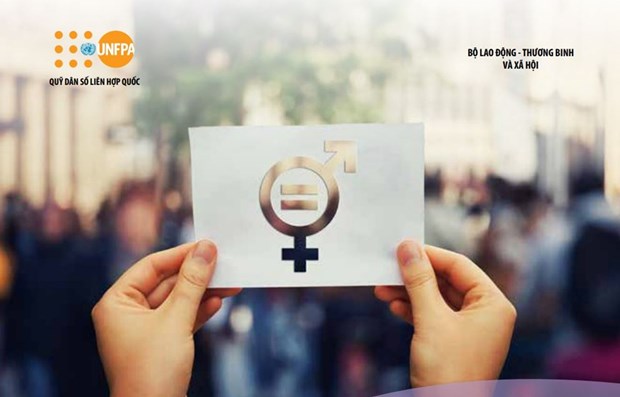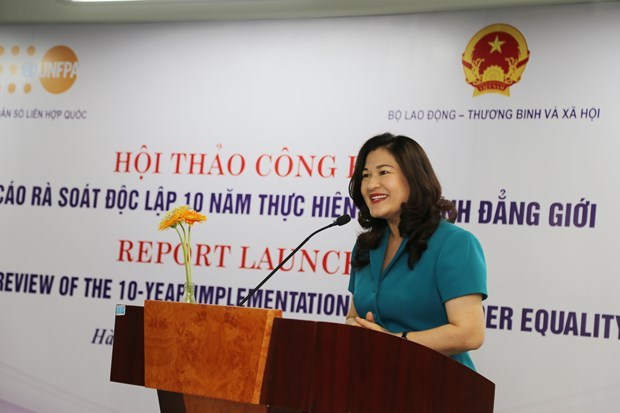Law on Gender Equality conforms to international standards on human rights
The Law on Gender Equality of Vietnam was built in conformity with international standards on human rights, including binding international treaties that the country has participated in and inter-Governmental agreements, heard a recent conference.
 Gender equality work sees improvement in both consciousness and behaviour (Illustrative photo: VNA)
Gender equality work sees improvement in both consciousness and behaviour (Illustrative photo: VNA)Hanoi (VNA) – The Law on Gender Equality of Vietnam was built in conformity with international standards on human rights, including binding international treaties that the country has participated in and inter-Governmental agreements, heard a recent conference.
The event was jointly organised by the Ministry of Labour, Invalids and Social Affairs and the United Nations Population Fund (UNFPA) to release the independent Review of Ten Years of Implementing the Law on Gender Equality.
Law on Gender Equality conforms to international standards
Vietnam has signed numerous international documents on gender equality and women’s empowerment. In 2006, the nation issued the Law on Gender Equality, which requires Government agencies and all-level People’s Committees to work on their responsibilities for State management in gender equality.
The Ministry of Labour, Invalids and Social Affairs coordinated with the UNFPA in conducting the review report. The report, conducted from June 2018 to June 2019, focuses on an assessment of the Law on Gender Equality’s conformity with international human rights standards and other Vietnamese laws and the effectiveness of the implementation of the law by those responsible since it came into effect in 2007. It also identifies key gaps to inform the revision of the law and ensure better implementation and provides recommendations for amendments and supplementation.
Vietnam is one among the country with a relatively comprehensive legal and policy framework to promote gender equality. The general principle in the Constitution was concretised in the Law on Gender Equality and other legal documents and policies in all aspects of life, which shows the Party and State’s determination as well as the country’s efforts to realise its commitments to international conventions and laws such as the Convention on the Elimination of All Forms of Discrimination against Women (CEDAW), the 1995 Beijing Platform for Action, Millennium Development Goals and Sustainable Development Goals.
According to the report, the Law on Gender Equality conforms to international standards on human rights, including binding international treaties that the country has participated in, inter-Governmental agreements, declarations and documents. It is also in line with the principle of substantial equality to ensure women and men can enjoy fair achievements. It contains special measures to promote women’s equality in accordance with CEDAW and other international standards, including clauses regarding women’s engagement in political affairs.
The report reveals that in the National Assembly (NA) elections for the 2016-2021 term, 26.8 percent of deputies elected were women, compared to the average of 19 percent in Asia and 25 percent globally.
Discrimination behaviours need to be identified
In her remarks, Deputy Minister of Labour, Invalids and Social Affairs Nguyen Thi Ha said Vietnam has seen encouraging progress in promoting gender equality, with positive changes in attitudes and behaviours among power holders, civil servants and citizens, contributing to heightening the role and position of women in the family and society.
 Deputy Minister of Labour, Invalids and Social Affairs Nguyen Thi Ha (Photo: VNA)
Deputy Minister of Labour, Invalids and Social Affairs Nguyen Thi Ha (Photo: VNA)Ha, who is also Standing Vice Chairperson of the National Committee for the Advancement of Women in Vietnam, noted that the country has been recognised by the international community for its efforts in gender equality, adding that the law enforcement, however, still faces various challenges.
Both men and women actually suffer the impact of gender inequality but women and girls are more vulnerable, she noted.
The deputy minister went on to say that the review provides realistic comments and assessments about the Law on Gender Equality, which should be revised and amended in the time to come.
UNFPA Representative Naomi Kitahara said that, over the past decade, Vietnam has counted among Asia-Pacific nations achieving progress in gender equality, with the most considerable move seen in advancing women’s rights and empowerment in the areas of health care and education through improving the legal framework and institutions.
Gender equality, one of the 17 Sustainable Development Goals, is not only a fundamental human right, but also a necessary foundation for a peaceful and prosperous Vietnamese society, she said./.













